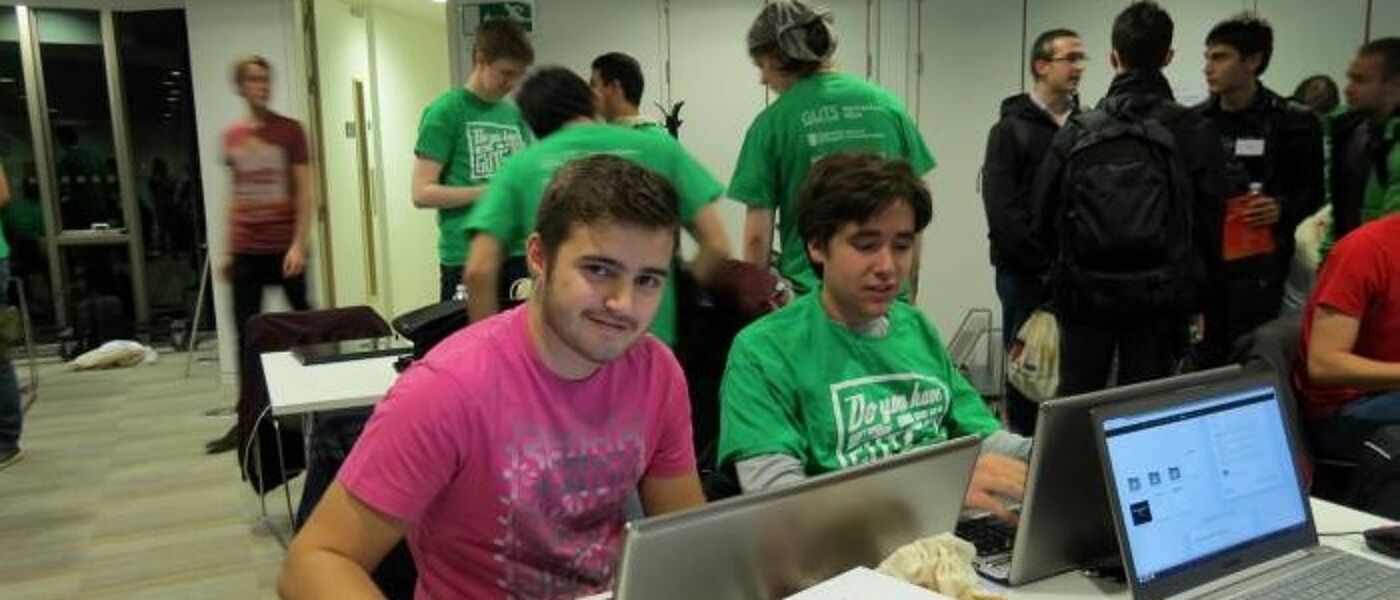INFORMATION FOR NEW AND CONTINUING STUDENTS
Computing Science labs and facilities
Find your way
Coronavirus
- UofG updates and guidance
- FAQs on the Computing Science Summer exam diet, GPA and progression
- PGR@Home
- Asymptomatic testing

Study abroad and exchange
Student Guides
Our student handbooks contain lots of useful information:
Course Catalogue
Each programme consists of a number of modular courses. More detailed information on our wide range of courses is available in the Course Catalogue, including detailed aims and intended learning outcomes. Your choice of courses will be dependent upon your chosen degree programme and completion of any pre-requisites.
Choice and flexibility in undergraduate degrees
Choice and flexibility are key to the degree structure at the University of Glasgow and you will be assigned an academic adviser to guide you. In your first year you take courses in three subjects, which is normally followed by courses in two subjects in your second year. Choices are then made about what subject(s) to pursue for your honours years.
You are encouraged to make wise choices on your optional subjects, including a second subject that you might consider taking to honours level, as this will give you an alternative degree pathway in another subject should you decide for whatever reason not to pursue your studies in computing. You are strongly recommended to take 40 credits of Level 1 Mathematics in year 1 or 2 as this will increase your choices for our optional honours courses and your general preparedness for some of the more technical aspects of our material.
In your third, fourth and fifth years, you take core courses supplemented by options enabling you to follow your particular areas of interest. In your final year, you will do an individually supervised project. Personal transferable skills are integrated into our programmes at various levels, including collaborative and individual project work, presentation and technical writing, along with interpersonal, management and other transferable skills. Our MSci degrees have additional advanced courses and a more extensive project. Opportunities often exist for summer placements, while our MSci degree in Software Engineering offers the option for a full-year placement in the fourth year of studies.
Ethics Procedures
Assessed exercises
- If your assessed exercise will not involve the participation of other people, then you need not worry about ethical clearance at all.
- If your assessed exercise will involve the participation of other people, and you can honestly sign the ethics checklist for assessed exercises, then you need not apply for ethical approval. You should use appropriate introduction script and debriefing script, and include these together with your signed ethics checklist for assessed exercises as part of your assessment submission.
- If your assessed exercise will involve the participation of other people, and will not comply with any one or more of the points on the ethics checklist for assessed exercises, you should contact the chair of the School of Computing Science Ethics Committee (Prof Matthew Chalmers) for advice.
Student projects
For third year, fourth year, MSci or taught Masters projects:
- If your project will not involve the participation of other people, then you need not worry about ethical clearance at all.
- If your assessed exercise will involve the participation of other people, and you can honestly sign the ethics checklist for projects, then you need not apply for ethical approval. You should use appropriate introduction script and debriefing script, and include these together with your signed ethics checklist for projects as part of your project report. The responsibility for signing the checklist is a joint responsibility between both student and supervisor.
- If your evaluation will not comply with any one or more of the points on the ethics checklist for projects, then you will need to apply to the School Ethics Committee for ethics approval. Note that your project will not be covered by any prior ethical clearance that has been given for a similar project to another student or to your supervisors. For student projects, ethical approval is given to the student, not to the project. To apply for SoCS approval:
- read the British Psychological Society Code of Conduct
- complete a SOCS ethics approval form
- email the form to the chair of the SOCS Ethics Committee (Professor Matthew Chalmers), with
- “Request for ethics approval: your name” in the subject line
- your consent form student example consent form attached
- your information sheet student example infosheet attached
- your introduction script attached
- your debriefing script attached
You must not start your evaluation until you have received approval in response to your application. Routine applications will be considered by the SoCS Ethics Committee. More unusual projects (e.g. participants under the age of 16, or with an impairment) will require that your supervisor make a full ethics application to the College Ethics Committee. The responsibility for applying for this ethical approval is a joint responsibility shared between both student and supervisor.
Issues for all students to consider
Participants must not feel under any pressure to take part in a study. This means that neither the student nor the supervisor should be in any position of authority over the participants. The project cannot therefore require that participants perform any task that is mandatory for fulfilling study requirements for university courses that they are enrolled in.
If you intend to do an observational study where participants are observed doing a task in their normal lives, you may only do so if the participants have explicitly agreed to this observation taking place. Studies that observe participants' behaviour without their knowledge may not be undertaken by students unless College Ethics Committee approval has been obtained by their supervisor.
Projects that use interviews for the purposes of Requirements Elicitation must also comply with the 12 point checklist. If the Requirements Elicitation process will violate any of the 12 ethics points (e.g.: children under the age of 16; position of authority), then the student must submit an ethics approval form to the School Ethics Committee (as described above). The School Ethics Committee may approve such requests provided that the interview and other data collection methods are considered reasonable and sufficiently low-risk.
Only data collected for the purpose of the project may be used in the project, and a project cannot collect data for purposes other than the project. This means that data collected for other purposes by other people may not be used. We cannot, therefore, use student marks data from previous years to test out a system to record marks, we cannot use real patient data from a local doctor's surgery to test a database tool, we cannot use students' essays from previous years to test out a plagiarism system - even if the data is anonymised. In some cases, therefore, students will have to use ‘fake’ data in order to evaluate the worth of their system. This will be sufficient for them to display the Computing Science expertise that they need to demonstrate for the purposes of their project. Only if the participant has given permission for the data to be used for a particular purpose may be it be used for that purpose.
Privacy policies for students
Details of student privacy policies can be found below.
Student life
You can find out more about student life at Glasgow on the main University web site, including accommodation, careers, sports and recreation, student unions, and our many support services at www.glasgow.ac.uk/studentlife/
Student support and wellbeing
Information on student support and wellbeing services.
Undergraduate single honours strands or specialisms
If you study Computing Science single honours, you will have the option, if you wish, to specialise in one of the following areas:
- Data Management;
- Human Computer Interaction;
- Information Security;
- Parallel and Distributed Systems;
- Theoretical Computer Science.
Each strand has requirements on the optional courses that you must take and your individual project in level 4 must also be in the same area. If a strand is chosen and completed, it will appear on your degree transcript on graduation.


